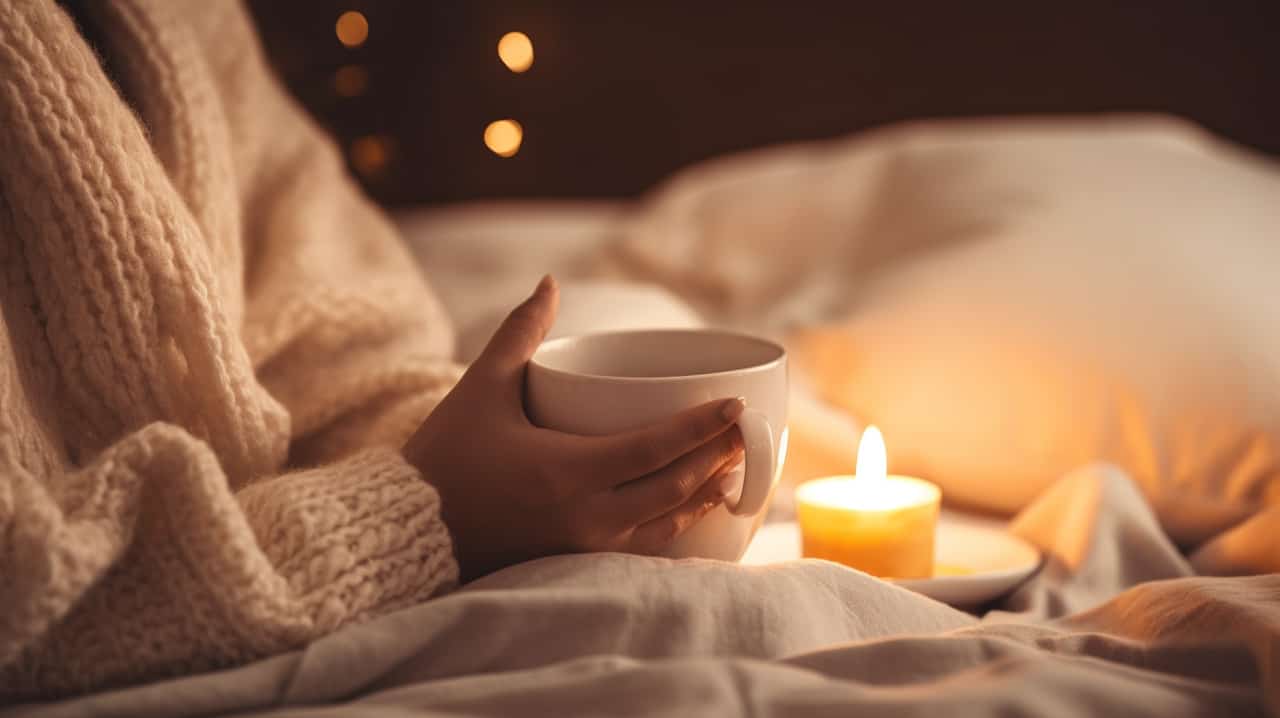Are you tired of counting sheep? I’ve been there too, struggling for an uninterrupted night’s rest. After a thorough deep-dive on the topic, backed by several reputable sources, including The National Library of Medicine and Sleep Foundation, I learned that certain teas can aid sleep naturally.
Come along as we explore these tranquilizing brews promising to turn your restless nights into peaceful slumbers!
Key Takeaways
Certain herbal teas, such as chamomile, valerian root, lavender, lemon balm, passionflower, and magnolia bark can promote a restful night’s sleep due to their calming and relaxing properties.
Chamomile tea contains flavonoids that have been scientifically proven to improve sleep quality and also offers additional health benefits like anti-inflammatory effects.
Valerian root tea is a natural sleep aid with sedative properties that can improve sleep quality without the unwanted side effects of traditional sleeping pills.
Lemon balm tea has been used for centuries to promote relaxation and improve sleep. It can reduce symptoms associated with insomnia, anxiety, and depression.
Table of Contents
Understanding the Connection Between Tea and Sleep
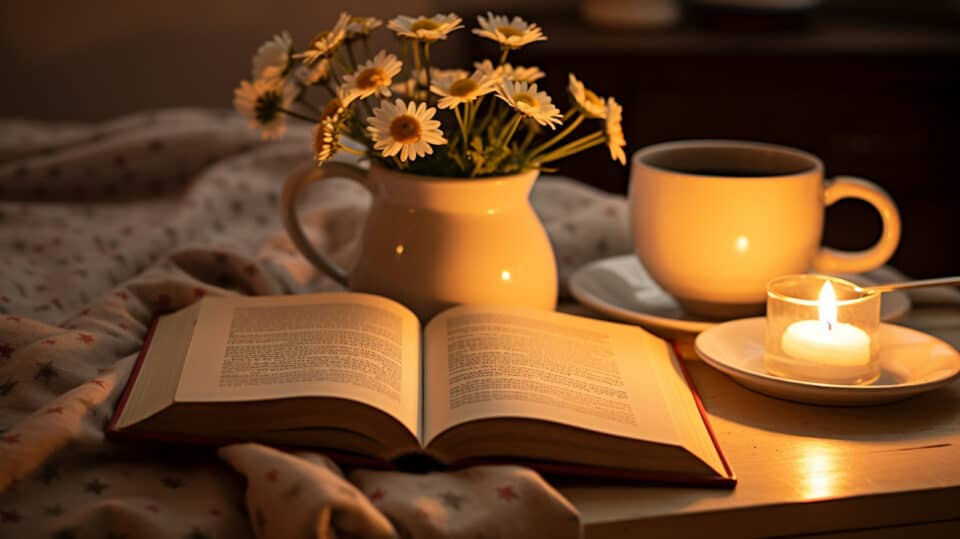
From a cozy routine to the beneficial properties of certain herbs, there’s a close connection between tea and sleep. Many of us have fond memories of sipping warm herbal teas before bedtime, an act that has both psychological and physiological effects on our sleep patterns.
Herbal teas, such as chamomile or lavender, are caffeine-free beverages known for their relaxing qualities. They contain natural compounds like flavonoids which exhibit mild sedative effects.
The science behind it is fascinating: Compounds in these teas interact with benzodiazepine receptors in the brain – neurotransmitters responsible for inducing sleepiness and reducing anxiety.
Also noteworthy is Valerian root tea, highly praised among herbal sleep aids due to its potent calming effect without the side effects traditional sleeping pills might bring along.
Then there’s Lemon balm tea – widely recognized for alleviating symptoms related to insomnia, anxiety, and even depression.
But keep this in mind: Although these natural alternatives can provide relief from common insomnia symptoms like restlessness or difficulty falling asleep, it’s not a one-size-fits-all solution.
The effectiveness can vary greatly depending on individual factors such as your personal health conditions or reactions to certain herbs. And remember, ladies – always consult your doctor first if you’re considering adding any new element to your nightly routine!
The Best Types of Tea for Sleep
Some of the best types of tea for sleep include chamomile tea, valerian root tea, lemon balm tea, lavender tea, passionflower tea, decaffeinated green tea, magnolia bark tea, and Bengal spice tea.
Chamomile Tea
Chamomile tea is one of my go-to choices for promoting restful sleep. Its power comes from the unique blend of flavonoids, a type of antioxidant that has been scientifically confirmed to improve sleep quality.
But chamomile tea isn’t just about better sleep – it also offers incredible health benefits.
For instance, beyond simply acting as a natural sleep aid, chamomile tea can have anti-inflammatory effects and serve as an antiviral and antibacterial medicine. So drinking this wonderful beverage regularly not only helps me with insomnia but also supports my overall health in impressive ways! If you’ve had issues with depression or anxiety, here’s some good news: research suggests that this herbal wonder can reduce depressive symptoms in postpartum women.
It’s a great aid for older adults, too, helping them combat lower quality of sleep effectively. For those concerned about taste, adding honey or maple syrup might help make your cup even more enjoyable!
Valerian Root Tea
As a woman who needs a good night’s sleep, take note of Valerian root tea. This is one of the best sleep-enhancing herbs you can rely on for improved rest at night. I’ve found this traditional remedy to be quite beneficial, and scientific research backs me up, too – it is considered an effective natural sleep aid.
Interestingly, the National Center for Biotechnology Information confirms its positive effect on both falling asleep and enhancing overall sleep quality. Best part? Unlike typical over-the-counter sleep aids or sedatives, which often come with unwanted side effects like grogginess or drowsiness in the morning, valerian root tea renders none of such discomforts.
It’s essential to consult your doctor before starting a nightly routine as some people may have reactions to herbal teas, but if your body agrees with it – you might just find yourself looking forward to bedtime!
Lemon Balm Tea
Lemon balm tea is a herbal tea that has been used for centuries to promote relaxation and improve sleep. It contains compounds that have a mild tranquilizing effect, making it an excellent choice for those struggling with insomnia, anxiety, or depression.
Studies have shown that lemon balm tea can reduce symptoms associated with these conditions and even lead to improved quality of life scores. So if you’re looking for a natural way to enhance your sleep, consider adding a cup of lemon balm tea to your bedtime routine.
Lavender Tea
I absolutely love lavender tea for a restful night’s sleep! Lavender has been shown to improve both the quality and duration of sleep, making it an excellent choice before bedtime.
This fragrant herb contains compounds that have a calming and relaxing effect on the body, helping to reduce stress and promote better sleep. Not only does lavender tea taste delicious with its subtle floral flavor, but it also has some incredible benefits for your sleep health.
So if you’re looking for a soothing cup of tea to help you unwind and get a good night’s sleep, I highly recommend giving lavender tea a try!
Passionflower Tea
Passionflower tea is a great option to consider if you’re looking for a natural sleep aid. This herbal tea contains flavonoids that can bind to receptors in the brain, similar to benzodiazepines, and may help reduce symptoms of anxiety and improve sleep.
It has been used for centuries as a remedy for insomnia and restlessness, thanks to its calming properties. Drinking passionflower tea before bed can help promote relaxation and create the perfect environment for a restful night’s sleep.
So if you’re struggling with sleep issues or just need some extra help winding down at night, give passionflower tea a try!
Decaffeinated Green Tea
In my personal experience, I have found that decaffeinated green tea is one of the best types of tea to drink before bed if you’re looking for a restful night’s sleep. It has been associated with improved sleep quality and can help promote relaxation without the stimulating effects of caffeine.
Green tea contains certain compounds, such as flavonoids, that have anti-inflammatory properties and can contribute to better sleep. Additionally, decaffeinated green tea is a great option for those who are sensitive to caffeine or trying to limit their intake later in the day.
So when it comes to choosing a bedtime tea, don’t forget about the potential benefits of decaffeinated green tea!
Magnolia Bark Tea
Magnolia bark tea is a herbal tea that has been shown to have sleep-inducing properties. It contains compounds that bind to GABA receptors in the brain, promoting relaxation and reducing anxiety.
These effects can help to calm the mind and prepare it for a restful night’s sleep. Magnolia bark tea can also be beneficial for individuals who experience difficulty falling asleep, as it has been shown to decrease sleep latency or the time it takes to fall asleep.
By incorporating magnolia bark tea into your bedtime routine, you may experience improved sleep quality and a more peaceful night’s rest.
Bengal Spice Tea
I absolutely love trying out different teas before bed, and one of my favorites is Bengal Spice Tea. While it’s not mentioned in this article specifically, it’s a delicious and aromatic herbal tea that can be a great choice for promoting relaxation and helping you wind down for a restful night’s sleep.
Even though we don’t have specific facts about its sleep-promoting properties, this tea typically contains a blend of warming spices like cinnamon, ginger, cardamom, and cloves which are known to have calming effects on the body.
So if you’re looking to create your own cozy bedtime routine with a comforting cup of tea, Bengal Spice might just be the perfect choice!
How Different Teas Promote Sleep
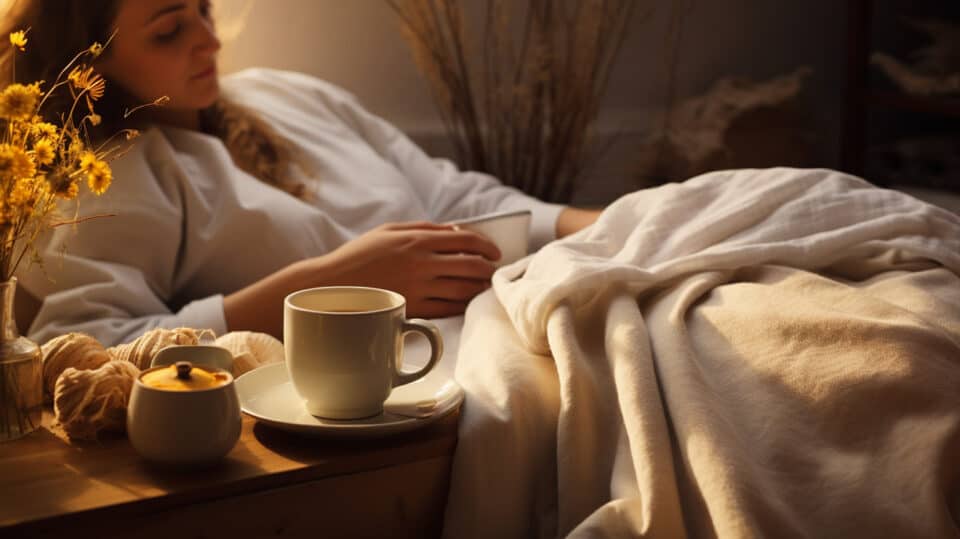
Different teas promote sleep through their unique properties and effects on the body. Chamomile tea has calming effects, valerian root tea acts as a sedative, lemon balm tea provides relaxation, lavender tea soothes the senses, passionflower tea induces sleep, decaffeinated green tea reduces stress, magnolia bark tea relieves anxiety, and Bengal spice tea promotes relaxation.
The Calming Effects of Chamomile
Chamomile tea is known for its calming effects and has been used for centuries as a natural sleep aid. This herbal tea contains compounds that have a mild tranquilizing effect, which can help reduce anxiety and promote relaxation before bed.
Studies have shown that chamomile tea can improve sleep quality by reducing the time it takes to fall asleep and increasing overall sleep duration. It also has anti-inflammatory properties and may help alleviate symptoms of insomnia, anxiety, and depression.
So if you’re looking for a soothing cup of tea to unwind before bed, chamomile might just be your perfect choice.
The Sedative Properties of Valerian Root
Valerian root is a natural herb that has been used for centuries as a sleep aid. It contains compounds that have sedative properties, which can help you drift off into a restful night’s sleep.
Studies have shown that valerian root extract can improve sleep quality and reduce the time it takes to fall asleep without the side effects often associated with traditional sleep aids.
So if you’re looking for a calming and effective tea to help you relax before bed, valerian root tea could be the perfect choice for you.
The Relaxing Qualities of Lemon Balm
Lemon balm tea is known for its relaxing qualities and has been used to reduce symptoms associated with insomnia, anxiety, and depression. This herbal tea has been shown to improve sleep quality by reducing fatigue and enhancing overall well-being.
Lemon balm contains compounds that have a mild tranquilizing effect on the body, promoting relaxation and calmness before bed. While more research is needed to fully understand its effectiveness as a sleep aid, many people find that sipping on a warm cup of lemon balm tea can help them unwind and prepare for a restful night’s sleep.
The Soothing Influence of Lavender
Lavender is widely known for its soothing influence on the mind and body, making it a popular choice for promoting restful sleep. Research has shown that lavender tea can help reduce stress and anxiety, which are common culprits of sleep disturbances.
It has also been found to improve sleep quality and duration, allowing you to wake up feeling more refreshed in the morning. The calming properties of lavender can create a peaceful atmosphere before bed, helping you unwind and prepare for a restful night’s sleep.
So if you’re looking for a natural way to relax your mind and drift off into dreamland, lavender tea might just be the perfect bedtime beverage for you.
The Sleep-Inducing Powers of Passionflower
Passionflower tea is a powerful herbal remedy that can work wonders for achieving a restful night’s sleep. This all-natural sleep aid contains compounds that increase GABA in the brain, promoting relaxation and calmness.
By increasing GABA levels, passionflower tea helps to reduce anxiety and quiet the mind, allowing you to drift off into a peaceful slumber. In addition, this sleep-inducing powerhouse has been found to improve overall sleep quality by enhancing deep sleep and reducing wakefulness throughout the night.
So if you’re looking for a natural way to catch some Zs, consider incorporating passionflower tea into your bedtime routine for a truly restful night’s sleep.
The Stress-Reducing Benefits of Decaffeinated Green Tea
One of the best teas to help reduce stress and promote a restful night’s sleep is decaffeinated green tea. Green tea contains an amino acid called L-theanine, which has been shown to have calming effects on the brain by increasing alpha-wave activity.
This can help you feel more relaxed and less stressed before bed. Additionally, green tea is rich in antioxidants that can help combat inflammation in the body, further promoting relaxation and reducing stress levels.
So, if you’re looking for a soothing bedtime beverage that can calm your mind and ease your stress, reach for a cup of decaffeinated green tea.
The Anxiety-Relieving Impact of Magnolia Bark Tea
Magnolia bark tea has an anxiety-relieving impact that can help calm the mind and promote a restful night’s sleep. This herbal tea contains compounds that bind to GABA receptors in the brain, which helps reduce feelings of anxiety and stress.
By supporting the GABA system in our brains, magnolia bark tea can have a sedative effect and promote relaxation. Research has shown that it can also reduce the time it takes to fall asleep, making it a great option for those struggling with insomnia or anxious thoughts at bedtime.
The Relaxation-Inducing Properties of Bengal Spice Tea
One tea that can help induce relaxation and promote a restful night’s sleep is Bengal Spice Tea. This naturally caffeine-free tea acts as a muscle relaxant and has been found to improve symptoms of irritable bowel syndrome (IBS).
It contains ingredients like cinnamon, ginger, cardamom, and cloves, which have anti-inflammatory properties and can help calm the body and mind before bedtime. Not only does Bengal Spice Tea taste delicious with its warm and soothing flavors, but it also provides the perfect blend of herbs to help you unwind and prepare for a peaceful slumber.
So next time you’re in need of some relaxation before bed, consider brewing yourself a cup of Bengal Spice Tea for a tranquil evening.
The Pros and Cons of Drinking Tea Before Bed
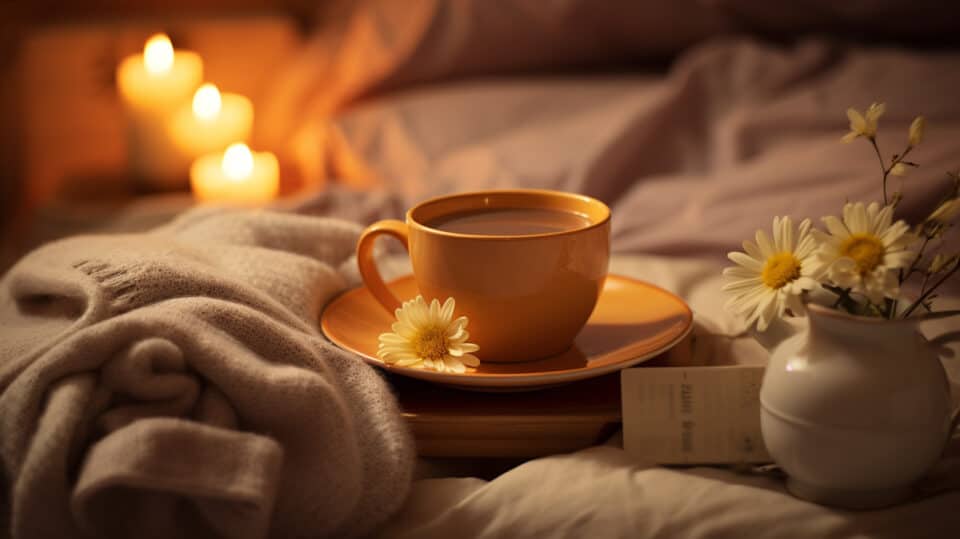
Pros
Drinking tea before bed can promote relaxation, improve sleep quality, and provide a natural alternative to sleep medications. Tea also contains antioxidants and other health benefits.
Incorporating a cup of herbal tea into your bedtime routine can have several benefits for a restful night’s sleep. One major advantage is that it can reduce stress and anxiety, making it easier to unwind before bed.
Tea can also serve as a safe alternative to prescription or over-the-counter sleep aids, providing natural sleep support without the risk of dependency or side effects. Additionally, having a consistent pre-sleep ritual like drinking tea can signal to your body that it’s time to wind down and prepare for a good night’s rest.
So why not sip on some soothing chamomile or lavender tea tonight? Your body will thank you for it!
Cons
While drinking tea before bed can have its benefits in promoting a restful night’s sleep, there are also some drawbacks to consider. One of the main concerns is that herbal teas, such as valerian root or chamomile, may interact with certain medications or cause allergic reactions in some individuals.
It’s important to consult with your doctor if you have any concerns about potential drug interactions or allergies before incorporating herbal teas into your bedtime routine. Another potential downside is that the research on the effectiveness of herbal teas as sleep aids is limited, and more studies are needed to fully understand their mechanisms of action and potential benefits.
Additionally, the long-term impact of lavender tea on sleep quality is still inconclusive. However, by being mindful of these factors and listening to your body’s response, you can make an informed decision about whether or not incorporating tea into your evening routine is right for you.
How to Choose the Best Sleep-Inducing Tea
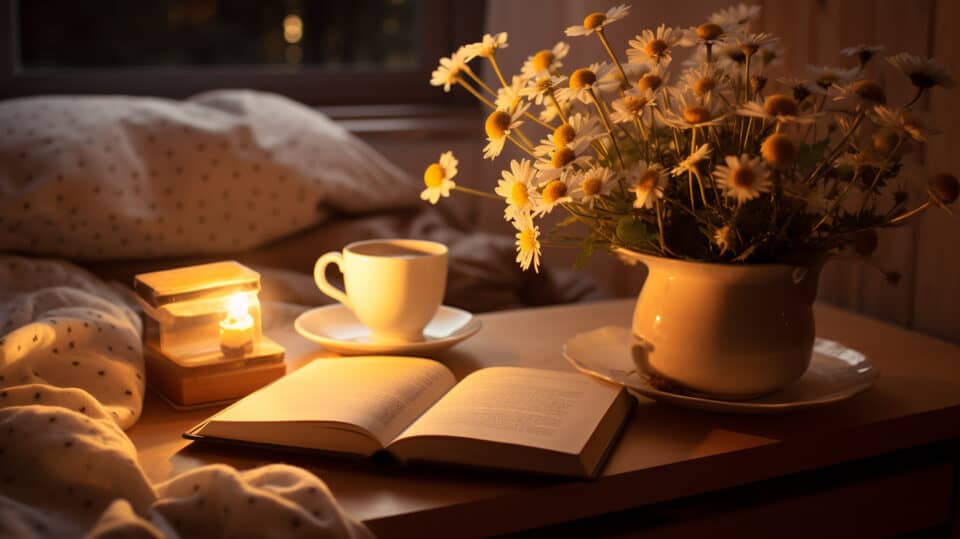
When choosing a sleep-inducing tea, it’s important to consider your desired effects, budget, type of tea, flavor preferences, and the quality of the tea.
Consider Your Desired Effects
When choosing a sleep-inducing tea, it’s important to consider the desired effects you’re looking for. Different teas have different properties and can provide various benefits for sleep.
For example, if you’re looking to relax your mind and unwind, chamomile tea is known for its calming effects and ability to improve sleep quality. On the other hand, if you struggle with falling asleep, valerian root tea has sedative properties that can help promote drowsiness.
Lemon balm tea is another option that can reduce symptoms of insomnia, anxiety, and depression. By considering your desired effects, you can choose the best tea that aligns with your specific needs for a restful night’s sleep.
Think About Your Budget
Considering your budget is an important factor when choosing a sleep-inducing tea. While there are many high-quality options available on the market, some can be quite expensive. It’s essential to evaluate how much you’re willing to spend and find teas that fit within your budget.
Thankfully, there are affordable options that provide excellent sleep benefits, such as chamomile and lavender tea. These herbal teas have compounds that promote relaxation and improve sleep quality without breaking the bank.
So, when choosing a tea to help you unwind before bed, keeping your budget in mind ensures you can enjoy a restful night’s sleep without straining your finances.
Evaluate the Type of Tea
When choosing a tea for better sleep, it’s important to evaluate the type of tea you’re considering. Look for herbal teas that have been scientifically researched and proven to promote relaxation and improve sleep quality.
For example, chamomile tea contains compounds that have a mild tranquilizing effect, helping you unwind after a long day. Lavender tea can also improve both the duration and quality of your sleep, although its effects may be more short-term.
Lemon balm tea has been shown to reduce symptoms of insomnia, anxiety, and depression. Passionflower tea is another great option, as it can help reduce anxiety symptoms and improve sleep.
Reflect on the Flavor
When choosing a tea to drink before bed, it’s important to reflect on the flavor and think about what you find soothing and enjoyable. The taste of the tea can play a role in helping you relax and unwind before sleep.
For example, chamomile tea has a mild, floral flavor that many find calming and comforting. On the other hand, lavender tea has a delicate, floral taste that can be both relaxing and refreshing.
Lemon balm tea has a citrusy flavor that is light and uplifting, while passionflower tea has an earthy taste with hints of sweetness. Reflecting on the flavors can help enhance your overall experience and make your bedtime routine even more enjoyable.
Assess the Quality of Tea
When choosing a sleep-inducing tea, it’s important to assess the quality of the tea you’re considering. Look for teas that are organic and non-GMO certified, as these ensure that the ingredients used are free from harmful pesticides and genetically modified organisms.
Additionally, check if the tea has undergone third-party testing to guarantee its purity and safety. A chemical-free extraction process is also desirable to preserve the natural benefits of the herbs used in the tea.
By prioritizing quality, you can ensure that you’re getting a high-quality sleep aid that will promote relaxation and improve your overall sleep quality.
Conclusion
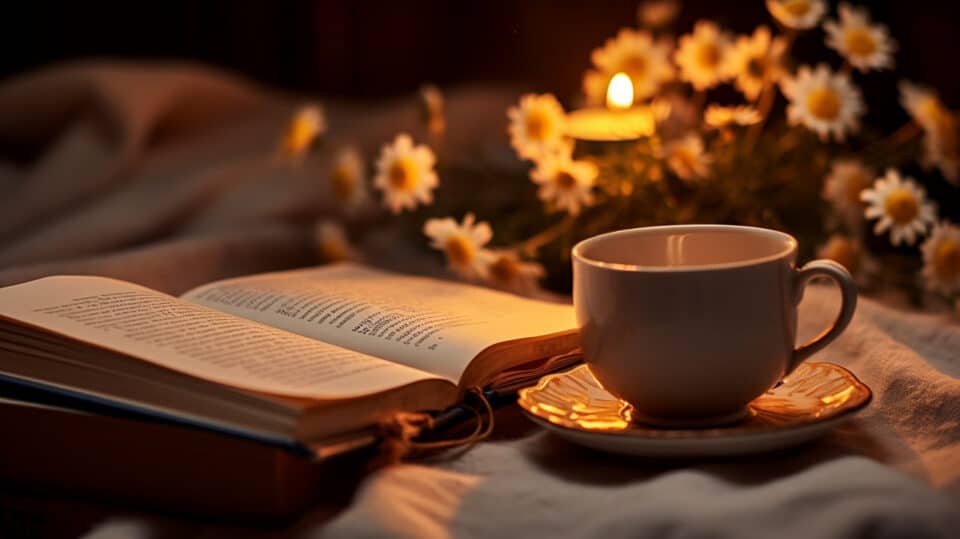
In conclusion, when it comes to choosing the best tea for a restful night’s sleep, herbal teas like chamomile, valerian root, lavender, lemon balm, passionflower, and magnolia bark are excellent options.
These teas have calming and relaxing properties that can promote relaxation and improve sleep quality. However, it is important to note that more research is needed to fully understand the benefits of these teas as sleep aids.
Remember to consider your desired effects, budget, type of tea, flavor preferences, and quality when selecting the perfect sleep-inducing tea. So brew yourself a cup of soothing herbal tea before bed and prepare for a peaceful night’s rest!
Frequently Asked Questions On Bengal Spice Tea’s Sleep Benefits
What kind of tea is best to drink before bed for a restful night’s sleep?
Chamomile tea is often recommended for its calming properties and ability to promote relaxation, making it an excellent choice before bedtime.
Are there any other types of tea that can help with sleep?
Other herbal teas such as lavender, valerian root, and peppermint are also known for their sleep-inducing effects and may be worth trying.
Is it okay to drink caffeinated tea before bed?
It is generally not recommended to consume caffeinated teas, such as black or green tea, before bed as they contain stimulants that can interfere with sleep quality.
Should I add anything to my bedtime tea for better results?
Some people find adding honey or a slice of lemon to their bedtime tea enhances the taste and overall relaxation experience, but this is purely based on personal preference.
